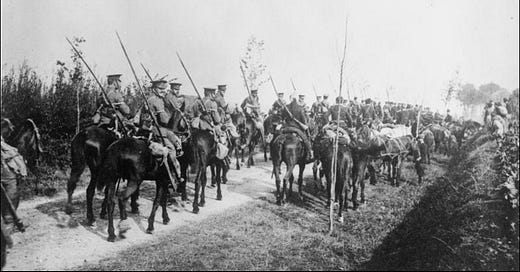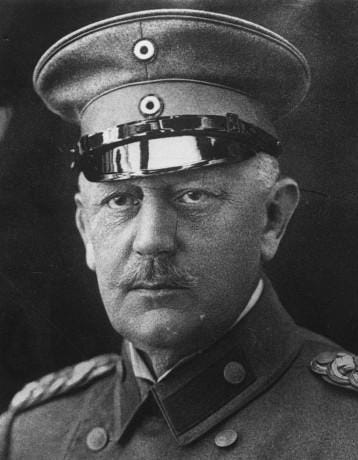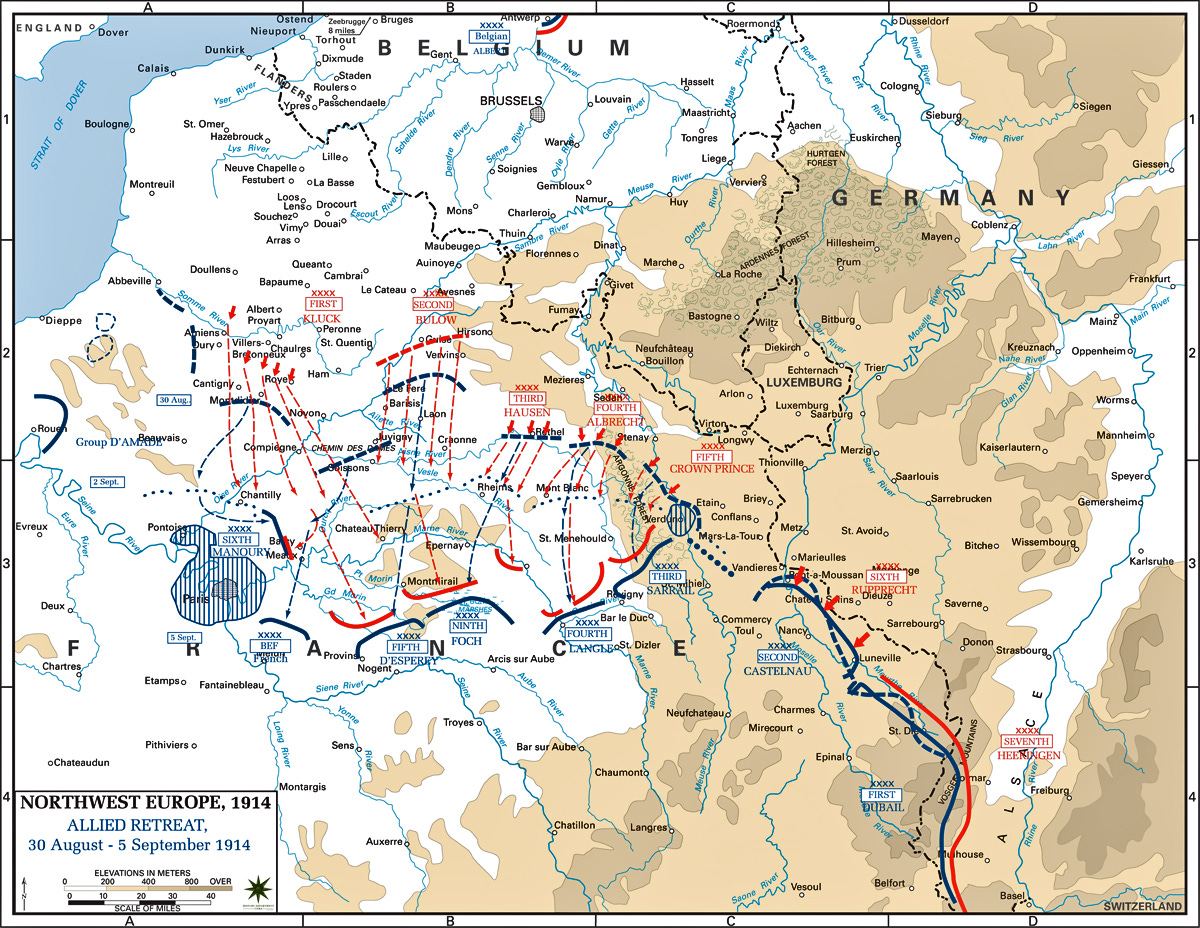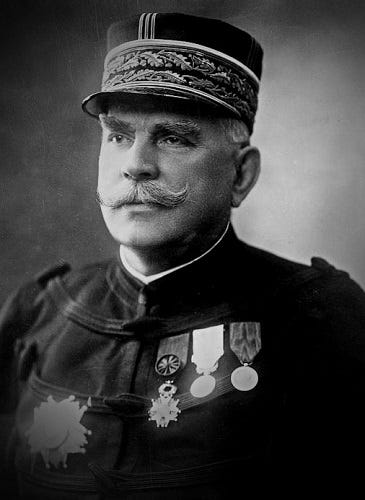Part Five: Opening Round in the West (2)
(For clarity, German unit designations are rendered in italics.)
Up to 25 August, the German offensive against France proceeded more or less according to plan. The three armies of the German right wing had swept over Belgium into France, pressing back the French and British forces in that area. Meanwhile the French offensives in Lorraine and the Ardennes had been repulsed with heavy losses. But General von Moltke, Chief of the OHL (Oberste Heeresleitung or Army High Command) and de facto commander-in-chief, was plagued by doubts and uncertainties.
It will be recalled that Schlieffen’s original Aufmarsch I West plan demanded the strongest possible concentration of forces on the German right flank. Lorraine and Alsace were to be defended by a thin screen of reserve and Landwehr troops, who if necessary would give ground in the face of a French offensive. Moltke, however, worried about a French breakthrough in this sector, which might imperil the Rhineland. He had therefore taken forces from the right wing to bolster up the left.
As the German offensive progressed, the right wing was further weakened. Troops had to be detached to guard the advancing armies’ lengthening lines of communications. The Belgian Army, seven divisions strong, had withdrawn into the fortified Antwerp position on the Channel coast, from which redoubt it posed a threat to the German right flank. The advancing Germans were thus compelled to leave a corps behind to mask Antwerp. Finally, the series of battles that the right-wing armies had already fought cost them many casualties. The closer they drew to Paris, the more their strength diminished.
Another worry nagged at Moltke. In far-off East Prussia the Russian Army had commenced a major offensive. Urged on by French pleas for the earliest possible action, the Russians attacked without waiting for their mobilization to be completed. Now two Russian field armies were advancing into the ancient heartland of the Hohenzollern monarchy. The defenders, embodied in Eighth Army, were outnumbered at least two to one.
Formally the plan was to yield ground in East Prussia if necessary, but patriotic sentiment and considerations of public morale argued against this. As the Russian offensive developed, Moltke came under more and more pressure to send reinforcements east, and these could only come from the western theater. Eventually he succumbed to that pressure, taking three corps (six infantry divisions) and a cavalry division from the armies of his right wing and dispatching them to East Prussia—where, as things turned out, they arrived too late to take part in the Battle of Tannenberg.
Moltke also erred in giving in to the pleas of the commanders of his left-wing armies for permission to launch a counteroffensive against the French in their sector. Crown Prince Rupprecht of Bavaria, commanding Sixth Army, argued that having won a great defensive victory, the German left wing should go over to the attack. Tempted by visions of a double envelopment of the French armies, the Chief of Staff sanctioned a counteroffensive by Sixth and Seventh Armies. The attack commenced on 23 August. But the Germans made little headway against the French, to whom the advantages of the defensive now accrued, and suffered heavy casualties (see map below).
Meanwhile, the German right wing’s axis of advance had diverged from that set down in Schlieffen’s 1905 plan. “Let the last man on the right brush the Channel with his sleeve,” he had famously advised—but in the series of battles that punctuated the Great Retreat, the three armies of the right wing were drawn farther and farther to the southeast. The map above shows the German advance between 30 August and 5 September; note particularly First Army’s sharp turn. Sensing the gap between Fifth Army and the BEF, Kluck sought to exploit it. He was also anxious to maintain touch with Second Army on his left. These tactical considerations, though not without validity, were incompatible with Schlieffen’s grand design: the envelopment of both Paris and the left wing of the French Army.
Still, between 25 August and the end of the month, the advance of the German right wing continued. By 1 September the Allied line was bent at a ninety-degree angle with Verdun as the hinge. But Moltke remained uneasy, even fearful. He observed to his staff that despite their successes, the German armies had not yet delivered a knockout blow. And because OHL (now situated in occupied Luxembourg) was far from the fighting front, the exercise of command from headquarters was increasingly difficult. Bit by bit, Moltke was losing his grip—not only on the battle but on his nerves.
This brewing command crisis at OHL was compounded by a lack of intermediate headquarters between OHL and the field armies. No provision had been made for army group commands to coordinate, for example, the three armies of the right wing. In the absence of such coordination the movements of the individual armies became disjointed, each commander maneuvering as he thought best. Attempts to remedy this defect by putting one army commander in charge of another, e.g. Bülow (Second Army) over Kluck (First Army) caused more problems than it solved.
Still, as of 1 September the issue remained in doubt. Tired and diminished as they were, the German armies were now within striking distance of Paris. With one final effort they might crush the enemy’s left flank, capture the French capital and, possibly, end the war in the west. On the other hand, the French armies and the BEF, concentrating as they drew closer to Paris, might stop the Germans and throw them back.
After a month of bloody combat, the crisis of the opening round in the west was at hand.







Something that has always surprised me is the number of generals who excel in a peacetime army, and fail in war.
I look at the American military - general officers who excel at politics and pleasing the big corporations who will hire them after retirement.
Milley with his chest full of medals, his concerns with wokeness, and his extraordinary willingness to communicate with the Chinese.
The generals who presided over a humiliating withdrawal from Afghanistan and suffered no career consequences. And apparently felt no shame either.
How well will these "perfumed princes" (Hackworth) perform in war?
As always, it will be the combat troops who suffer while the incompetent generals are weeded out (Kasserine Pass).